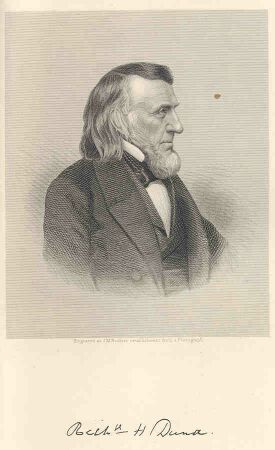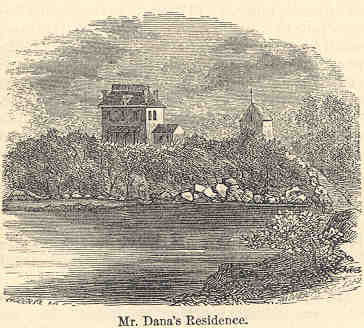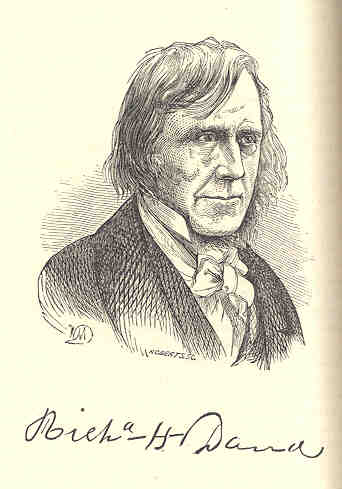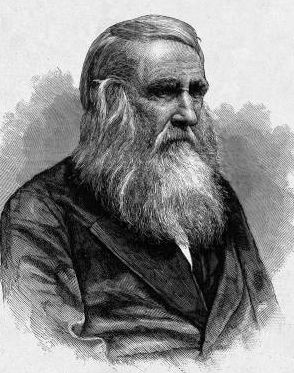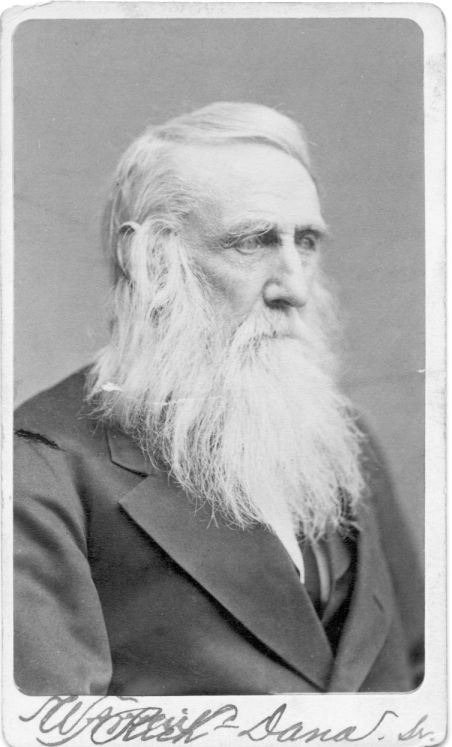|
Richard Henry Dana, Sr.
Rufus Wilmot Griswold, The Poets and Poetry
"Richard Henry Dana was born at Cambridge, on the fifteenth of November, 1787. When about ten years old he went to Newport, Rhode Island, where he remained until a year or two before he entered Harvard college. His health, during his boyhood, was too poor to admit of very constant application to study; and much of his time was passed in rambling along the rock-bound coast, listening to the roar and dashing of the waters, and searching for the wild and picturesque; indicating thus early that love of nature which is evinced in nearly all his subsequent writings, and acquiring that perfect knowledge of the scenery of the sea which is shown in the "Buccaneer," and some of his minor pieces. On leaving college, in 1807, he returned to Newport, and passed nearly two years in studying the Latin language and literature, after which he went to Baltimore, and entered as a student the law office of General Robert Goodloe Harper. The approach of the second war with Great Britain, and the extreme unpopularity of all persons known to belong to the federal party, induced him to return to Cambridge, where he finished his course of study and opened an office. He soon became a member of the legislature, and was for a time a warm partisan. Feeble health, and great constitutional sensitiveness, the whole current of his mind and feelings, convinced him that he was unfitted for his profession, and he closed his office to assist his relative, Professor Edward T. Channing, in the management of the 'North American Review,' which had then been established about two years. While connected with this periodical he wrote several articles which (particularly one upon Hazlitt's British Poets) excited much attention among the literary men of Boston and Cambridge. The Pope and Queen Anne school was then triumphant, and the dicta of Jeffery were law. Dana praised Wordsworth and Coleridge, and saw much to admire in Bryon; he thought poetry was something more than a recreation; that it was something superinduced upon the realities of life; he believed the ideal and the spiritual might be as real as the visible and the tangible; thought there were truths beyond the understanding and the senses, and not to be reached by ratiocination; and indeed broached many paradoxes not to be tolerated then, but which now the same community has taken up and carried to an extent at that time untaught of. "A second party rose against these opinions, and Dana had the whole influence of the university, of the literary and fashionable society of the city, and of the press, to contend against. Being in a minority with the 'Northern American Club,' he in 1819 or 1820 gave up all connection with the Review, which passed into the hands of the Everetts and others, and in 1821 began 'The Idle Man,' for which he found a publisher in Mr. Charles Wiley, of New York. This was read and admired by a class of literary men, but it was of too high a character for the period, and on the publication of the first number of the second volume, Dana received from Mr. Wiley information that he was 'writing himself into debt,' and gave up the work. In 1825, he published his first poetical production, 'The Dying Raven,' in the 'New York Review,' then edited by Mr. Bryant; and two years after gave to the public, in a small volume, 'The Buccaneer, and other Poems. This was well received, the popular taste having, in the five years which had elapsed since the publication of the 'Idle Man,' been considerably improved; but as his publishers failed soon after it was printed, the poet was not made richer by his toil. In 1833 he published his 'Poems and Prose Writings,' including 'The Buccaneer,' and other pieces embraced in his previous volume, with some new poems, and the 'Idle Man,' except the few papers written for it by his friends. For this he received from his bookseller about enough to make up for the loss he had sustained by the 'Idle Man.' His case illustrates the usual extent of the rewards of exertion in the higher department of literature in this country. Had his first work been successful, he would probably have been a voluminous writer. In 1839, he delivered in Boston and New York a series of lectures on English poetry, and the great masters of the art, which were warmly applauded by the educated and judicious. These have not yet been printed The longest and most remarkable of Dana's poems is the 'Buccaneer,' a story in which he has depicted with singular power the stronger and darker passions. It is based on a tradition of a murder committed on an island on the cost of New England, by a pirate, whose guilt in the end meets with strange and terrible retribution. In attempting to compress his language he is sometimes slightly obscure, and his verse is occasionally harsh, but never feeble, never without meaning. The 'Buccaneer' is followed by a poem of very different character, entitled 'The Changes of Home,' in which is related the affect of two young persons, in humble life, whose marriage is deferred until the lover shall have earned the means of subsistence; his departure in search of gain; his return in disappointment; his second departure; and death in absence—a sad history, and one that is too often lived. 'Factitious Life,' 'Thoughts on the Soul,' and 'The Husband's and Wife's Grave,' are the longest of his other poems, and, as well as his shorter pieces, they are distinguished for high religious purpose, profound philosophy, simple sentiment, and pure and vigorous diction. All the writings of Dana belong to the permanent literature of the country." [Source: Rufus Wilmot Griswold, The Poets and Poetry of America 111 (New York: James Miller, Publisher, 1872)] [online text]
Evert A. & George L. Duyckinck,
The Cyclopaedia of American Literature 786 Richard Henry Dana, Sr., a poet, essayist, and critic, was the son of Francis Dana, who served as chief justice on the Massachusetts Supreme Court. Dana's son, Richard Henry Dana, Jr., was also a lawyer and writer. Richard Henry Dana Richard
Henry Dana Richard
Henry Dana, Sr. Early
Essayists
Poems The Moss Supplicateth for the Poet To a Garden Flower Sent Me by a Lady Poetry Richard Henry Dana, Poems (Boston: Bowles and Dearborn, 1827) _______________, A Poem Delivered Before the Porter Rhetorical Society: in the Theological Seminary, Andover, September 22, 1829 (Boston: Perkins & Marvin, 1829) ________________, Poems and Prose Writings (Boston: Russell, Odiorne, and Co., J.D. Freeman, printer, 1833) [online text] ________________, The Buccaneer, and Other Poems (London: H.G. Clarke and Co., 1844) ________________, Poems and Prose Writings (New York: Baker and Scribner, 1850)(2 vols.) [online text; Vol. 1] [online text; Vol. 2] Edgar Allen Poe, The Poetical Works of Edgar Allan Poe, and Richard H. Dana (London: Routledge, Warne, and Routledge, 1861) Writings Richard Henry Dana, The Idle Man (New York: Wiley & Halstead, 1821) [online text] Bibliography Doreen M. Hunter, "Richard Henry Dana Sr.," in Eric L. Haralson (ed.), Encyclopedia of American Poetry: The Nineteenth Century (Chicago: Fitzroy Dearborn, 1998) Research Resources A
Guide to the Richard Henry Dana Sr. and Jr. Collection
[Carte de Visite Photograph, Photographer-Warren] |
